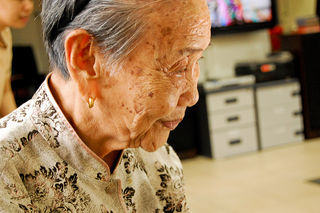Aging
Wise Up: Study Aging
Here’s why aging is a boon for psychology—and perhaps for you.
Posted July 13, 2016 Reviewed by Ekua Hagan
The plan wasn’t to study aging. No, I was to be a lawyer. A lawyer, until I realized: (1) that I didn’t have the moral fiber for lawyer-ing (and its inevitable politicking), and (2) that the market was already saturated with them.
It’s clear to me, in retrospect, how non-academic factors largely cultivated my interest in aging—especially because gerontological coursework was woefully, blindingly—but not atypically—absent from my undergraduate psychology curriculum.
In previous discussions elsewhere, I’ve implicated subjective age in my strong and unmistakable childhood (and current) attraction to the adult table. Admittedly, I’m unapologetically old-souled. In some ways, though, how old I feel reflects deep allegiance to, solidarity with, and respect for older adults that is probably grounded in decades of positive interactions with them.
Allport’s (1954) contact hypothesis supports this, positing that, under appropriate conditions, interpersonal contact deconstructs stereotypes assigned to outgroups. It stands to reason, then, that having positive exposure to familial and nonfamilial older adults consistently predicts entering gerontologically oriented vocations. For me, this undeniably computes. My community, parents, my grandparents, and mentors—all throughout my development—have modeled the beauty, the complexity, the privilege of human aging.
I am certainly not blind to how fortuitously my interest in aging aligns with the needs of an aging world—and I certainly don’t need additional convincing that my decision to forgo law school was in equal measure, wise and slightly prescient. But maybe you do.

Worldwide Demographic Transitions
Albeit obvious, the point must be made: The world and the United States are aging precipitously. Record low fertility rates in developed and developing countries alike, coupled with increases in life expectancy, have drastically altered the world’s constitution. The National Institute on Aging (NIA) reports that in 2050, the global population of older adults 65 and older is projected to be 2.5 times that of the population of children ages 0-4; an otherwise exact inversion of demographic patterns observed in 1950. And in 2030, when the last baby boomer turns 65, the U.S.’s landscape will have similarly changed, because one of every five Americans—roughly 72 million people—will be an older adult.
Shifting epidemiologic trends in the leading causes of death and disability globally—from communicable, parasitic diseases to chronic, degenerative ones—are symptomatic of the public health advancements promoting longevity. The World Health Organization (WHO) forecasts, that over the next 10 to 15 years, more people in every world region will suffer more death and illness from noncommunicable diseases like cancer, cardiovascular disease, and diabetes than from fatal infections.
In the United States, patterns of psychopathology are also shifting: Aging boomers report higher rates of mental disorder than current and preceding cohorts of older adults. Increases in the prevalence of psychopathology, combined with the complex mental health needs related to comorbid and chronic illness(es) in later life, invites—nay, implores—a new generation of clinicians to understand how disability and psychology uniquely interact to impact the health and function of older adults.
“Now that more of us have the privilege of growing older than ever before," says, Forrest Scogin, Ph.D., professor of Psychology at the University of Alabama and former president of the Society of Clinical Geropsychology, “the study of aging has never been more important than it is now.”
Demand

A recently published New York Times article reports that there are about 7,000 practicing geriatricians (that is, medical doctors specializing in the care of older adults) in the United States. To meet the demand, the American Geriatrics Society estimates that medical schools would have to train at least 6,250 additional geriatricians between now and 2030—450 more annually than the current rate. This is a tall order, especially because geriatrics is one of the few medical niches in the U.S. that is contracting even as the need increases, with fewer and fewer residents pursuing it as a specialty.
“I think this may be associated with the idea that aging is exclusively a process of loss and decrement and thus the investigation of such is depressing and somewhat hopeless,” explains Scogin.
Charles Emlet, Ph.D., LCSW, ACSW, and professor of social work at the University of Washington-Tacoma agrees, observing that: “Gerontology has been underrepresented in many health and behavioral sciences including medicine, nursing, psychology, and social work.”
“The intrinsic and embedded ageist views society holds create this value base,” he adds.
For clinical psychologists, the problem appears slightly different. While there is no shortage of older adults requiring psychological services—and willing clinicians to provide them—very few are technically qualified to do so. Findings from a 2002 survey of the American Psychological Association showed that while 69% of respondents reported some professional work with older adults, only 3% spent most of the time working with them because a blinding majority felt undertrained.
While, topically, these data might seem discouraging, rest assured they aren’t. For these and other reasons—that is, medical disinterest coupled with systemic gaps in training—the past few decades have seen a growth of graduate programs preparing psychologists for work with older adults. The advent of the Pikes Peak Model, which essentially codified competency areas for the training of clinical geropsychologists, has largely facilitated this growth.
And with the growing traction of evidence-based psychotherapies, including Cognitive Behavioral Therapy (CBT), which has proven to be equal to or superior to standalone pharmacological interventions for common late-life disorders like depression and insomnia, the value and visibility of geropsychologists across settings are well-positioned to increase.
“We’ve come to learn that growing older is associated with positive changes and I think that may increase interest,” explains Scogin. “Aging is an integral part of life and the study of how we age will continue to help us improve the quality of life across the life span.”
Uncharted Research Territory
Nearly doubling adult life expectancy is an unquestioned triumph of the 20th century. A consequence is that science has begun to exploit the latter half of the human life span—and opportunities to study the phenomena our own biology once largely precluded are now both vast and uncharted.
“While many populations that are studied in human service research can be psychologically seen as ‘other’ or apart from ourselves, aging is different,” says Emlet. “We all age and thus have an inherent interest in that process.”
There has been, for example, growing interest in understanding the lived experiences of older adults living with human immunodeficiency virus (HIV) due to the confluence of incident infections in this population and the increasing long-term survival of seropositive adults.
“Older adults living with HIV are confronting physiological and psychosocial issues no cohort has ever encountered before—premature age-related comorbidities, ageism and HIV stigma concurrently, for instance,” explains Emlet. “In many respects,” he continues, “HIV is no longer a terminal disease. It’s a chronic one that can now be studied accordingly, and into later life.”
Recommendations from the National Institutes of Health (NIH) Working Group on HIV and Aging have thus prioritized the study of psychosocial mechanisms promoting successful aging with HIV, including resilience and hardiness.
“By understanding how older adults age well, we can encourage and translate those findings into useful approaches for those not aging successfully with the disease,” says Emlet.
Of course, Alzheimer’s Disease (AD) is also receiving massive amounts of national attention. Reflecting the country’s determination to halt its scourge, NIH for the first time has proposed an additional $323 million above its estimated base budget in fiscal year 2017 toward the goal of preventing and treating AD by 2025.
But Alzheimer’s and HIV are but two areas in a lengthy catalogue of age-relevant topics inviting inquiry. Indeed, the research possibilities are nearly endless, and small and large research institutes alike are increasingly providing dissertation awards to promote the growth of scientific research on aging and aging-related health conditions.
The time to study aging (and get paid for it) is probably now.
Unique Attitudes & Perspectives

Studying aging may even be good for you.
“Personally, my experiences working with older adults have taught me about my own health, views, and the importance of self, family, and values in life.” Says Evan Plys, M.A., clinical geropsychology student at the University of Colorado, Colorado Springs, “Studying aging has had a lasting impact on my worldview and I view it as a gift for someone in their 20s to have such exposure and knowledge about older adulthood.”
Dr. Rebecca Levy’s research on aging self-stereotypes suggests their development and operation have identifiable characteristics and consequences. She argues that they originate in the form of aging stereotypes in childhood, which are reinforced throughout adulthood. When individuals reach old age, the aging stereotypes internalized in childhood—and then reinforced for decades—become self-stereotypes. These aging self-stereotypes can influence individuals’ cognition, behavior, and physical health. Many of her studies, for example, link more positive self-perceptions of aging with improved function and survival advantage.
“Studying aging can of course impact our personal view of the process. Through studying it, we get a clearer view of what it’s really about.” offers Emlet. “We meet incredibly interesting and vibrant older people in our work,” he adds.
It is conceivable that studying aging may interrupt this cycle of reinforced stereotype internalization, conferring unique “protective” health benefits to those who study it.
“Certainly understanding the factors related to better physical, cognitive, and emotional health in late life has had an influence on how I view the aging process. I may not always follow my own advice but at least I’m reasonably well-informed,” adds Scogin. “I think most of us who study aging have a fairly optimistic view of growing older.”
So wise up and study aging.
References
Allport, G. (1954). The nature of prejudice. Boston, MA: Addison-Wesley.
Chonody, J.M., & Wang, D. (2014). Predicting Social Work Students’ Interest in Gerontology: Results from an International Sample. Journal of Gerontological Social Work, 57:8, 773-789.
Cummings, S. M., & Alder, G. (2007). Predictors of social workers employment in gerontological social work. Educational Gerontology, 33, 925–938.
Knight, B. G., Karel, M.J., Hinrichsen, G.A., Qualls, S.H., & Duffy, M. (2009). Pikes Peak Model for Training in Professional Geropsychology. American Psychological Association, 64:3, 205-214.




